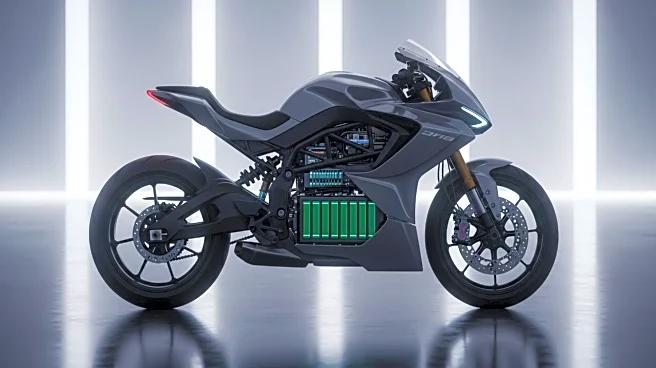What's Happening?
Ducati has introduced its V21L motorcycle prototype at the IAA Mobility trade show in Munich, showcasing a significant advancement in electric vehicle technology. The prototype is powered by QuantumScape solid-state lithium-metal batteries, marking a potential shift in the motorcycle industry away from internal combustion engines. Solid-state batteries have long been considered a breakthrough for electric vehicles due to their potential for higher energy density and safety compared to traditional lithium-ion batteries. Ducati's unveiling suggests a new era for electric motorcycles, with implications for broader automotive applications.
Why It's Important?
The introduction of solid-state batteries in Ducati's V21L prototype could revolutionize the electric vehicle industry, offering improved performance and safety. This development is significant for the U.S. motorcycle market, which has been gradually embracing electric models. Solid-state technology promises longer range and faster charging times, addressing key consumer concerns about electric vehicles. If successful, this innovation could lead to increased adoption of electric motorcycles, impacting manufacturers, consumers, and environmental policies. The shift could also influence the broader automotive industry, potentially accelerating the transition to electric vehicles.
What's Next?
Ducati's prototype may prompt other motorcycle manufacturers to explore solid-state battery technology, potentially leading to collaborations or competitive advancements. The success of this technology in motorcycles could pave the way for its application in cars, influencing industry standards and consumer expectations. Stakeholders, including manufacturers and policymakers, will likely monitor the performance and scalability of solid-state batteries, considering their implications for future vehicle designs and environmental regulations.
Beyond the Headlines
The adoption of solid-state batteries in motorcycles raises questions about the future of traditional motorcycle culture, which has been closely tied to the sound and feel of internal combustion engines. This shift may lead to changes in consumer preferences and the identity of motorcycle brands. Additionally, the environmental benefits of electric motorcycles could contribute to broader efforts to reduce carbon emissions and combat climate change.









